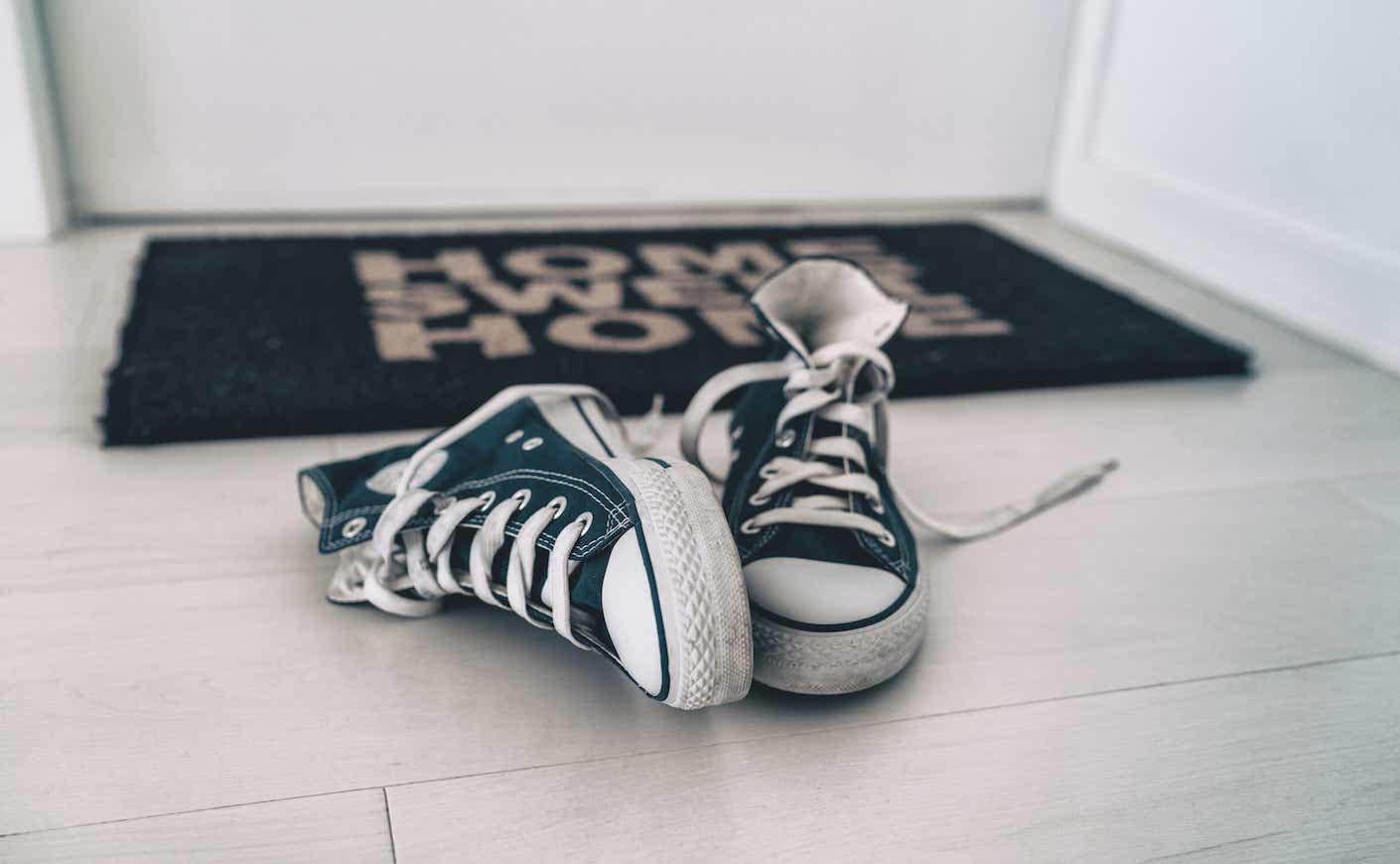Did anyone ever tell you not to “bring the outdoors in with you” when you were a kid? As we tend to learn when we’re young, taking your shoes off inside can be an important gesture of civility. In many cultures and religious spaces, it’s mandatory, and in countries like Japan, where it’s customary, morality and cleanliness are treated almost as one.
In the U.S., where taking off shoes indoors isn't ubiquitous, many of us still automatically ask whether we should go barefoot when we’re entering someone’s home. Some of the reasons are obvious: Anyone who was ever admonished by their parents for leaving dirt on a clean carpet has experienced the shame of a persistent stain, and we’re all well-versed in keeping footprints off wet wooden floors.
Though the trend gathered less momentum than Tiger King, baking banana bread, or having a protracted nervous breakdown, going barefoot (or at least shoeless or slippered) indoors became more popular during the coronavirus pandemic. Not only did the lockdown render outerwear largely irrelevant, but before much was known about the disease, people were eager to reduce the potential means by which it entered the home. Oftentimes, shoes were abandoned at the door amid concerns that they’d bring the coronavirus in with them. Though those fears were largely overblown, there may be some health risks to wearing shoes inside — and some active benefits to letting your feet breathe awhile.
Should we remove our shoes before coming inside?
In short? Probably. “The main reason for wearing shoes indoors is comfort,” Blanca Aguirrezabal, a former housekeeper and a blogger about all things home, hygiene, and decluttering, tells KCM. But this prevents feet from breathing properly, which can lead to fungus and bacteria growth.
In addition to giving your feet a break from claustrophobic footwear, it may be wise to avoid the risk of bringing nasty germs from outside into your house, if you can. According to a 2008 study by microbiologist Charles Gerba of the University of Arizona, subjects gathered an extraordinary quantity of bacteria on the soles of their shoes after two weeks — collecting 421,000 units of bacteria on the outside of each shoe, on average. Upsettingly, 96 percent of the shoes bore traces of the fecal bacteria E. Coli, an infamous culprit behind severe GI and urinary tract infections.
To people without kids — who behave like walking, talking mops, especially in their crawling phase — this may still not seem like an enormous risk. It’s not like we’re eating off the floor, right? But the last time you dropped something on the floor and had to pick it up, did you wash your hands right afterward?
Perhaps even more concerning than the gross E. Coli news, some of the disease-causing organisms we bring in on our shoes are resistant to drugs, meaning they can cause illnesses that are difficult to treat. “Add in cancer-causing toxins from asphalt road residue,” environmental chemists writing for CNN said this year, “and endocrine-disrupting lawn chemicals, and you might view the filth on your shoes in a new light.”
Thankfully, as Aguirrezabal explains, all this nastiness is avoidable with a simple no-shoes-indoors rule. “This policy can help in reducing the spread of parasites and other disease-causing bacteria,” she assures.
This all sounds really gross. Is there anything else we can do to “shoe-proof” our homes?
Don’t stress too much — just taking your shoes off at the door will sufficiently protect you from the harmful bacteria they carry. But if you’re Monica-from-Friends-level keen on germ-busting, there are a few more things you can do.
“Consider installing anti-microbial flooring or walls that are resistant to mold and mildew growth,” suggests Aguirrezabal. “And make sure to keep your home clean by regularly dusting surfaces and cleaning window sills, door thresholds, baseboards, crown moldings, entryways, and closets." And she says that the effect of all this finicky behavior might go beyond wellness. "In addition to preventing health problems caused by dirty environments," says Aguirrezabal, "keeping your house clean will also boost your mood.”
So should we ask guests to leave their shoes at the door?
In an ideal world — and assuming that it's reasonable considering the guests’ needs — yes. Of course, this isn’t necessarily a stress-free request for everyone: Lifestyle websites have been known to agonize over how to precisely ask guests to remove their footwear without making them feel unwelcome, and every host dreads kicking off an evening on the wrong foot (sorry).
Ideally, according to an etiquette expert who spoke to MarthaStewart.com, you should keep the interaction as relaxed as possible. If possible, give your guests a heads-up in advance, saying something like: “We have a no-shoes policy here at our house, so when you come over please bring your favorite slippers or comfy socks.”
If you can, make sure there’s a tidy, comfortable place set up for guests to remove their shoes when they enter, plus somewhere convenient for them to store their shoes until they leave.









